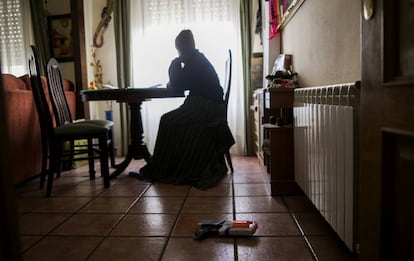In Spain, many face stark choice between proper meals or warm homes
A Red Cross study shows that nearly a million of its beneficiaries have trouble paying for food, medicine and school supplies


Almost a million people helped by the Spanish Red Cross are being forced to choose between paying for basic items such as food, medicine and school supplies, or heating their homes.
That is 58.8% of the 1.7 million people benefiting from Red Cross social programs, according to a report on social vulnerability released last week by the non-profit group.
We have to make sure that people take advantage of their rights. That would improve a lot of lives
Antoni Bruel, Red Cross Spain
Based on a survey of 849 people, the study shows that 65% have trouble meeting the monthly costs of running a home, including mortgage or rental payments, water and heating, community bills, insurance premiums and city taxes. And 83% are at three times the risk than the population in general of either falling below the poverty line or being marginalized.
“My house belonged to the bank and I paid the rent,” says María Agustina, a middle-aged woman who features on a video released by the Red Cross. “But the bank sold the house to a financial group that threw us out. A young man then let me use a bank-owned apartment that was in poor condition, but at least I have a roof over my head. It needs refurbishing but I can’t afford it. Right now, I have no gas at home.”
More than 90% of the people who use the Red Cross services live in homes in need of improvement: 46.3% lack heating systems, 29.8% have poor insulation, and 29.8% have problems with leaks and damp.
There are days when you break down and lose the will to live
María Isabel, aid recipient
“Half the people we help have to make terrible choices,” says Antoni Bruel i Carreras, general coordinator for Red Cross Spain. “They have to choose between paying the rent and paying for utilities. It’s not that they don’t eat, but they eat poorly. These are people who are going without medicine and decent food, without dental care, without after-school activities and school supplies for their children.”
“There are days when you break down and lose the will to live,” says María Isabel, another woman on Red Cross assistance “Just €430 is coming in to my house a month. How do you pay the water, electricity and gas bills on that?”
Mostly women
The majority of people receiving aid from the Red Cross are women (68%), and nearly half the homes that receive help have children under the age of 16. Most of these kids, 93.3%, are experiencing child poverty. “We’re talking about a family of four with less than €1,490 a month to live on,” Bruel explains.
Among those helped by the Red Cross, 14.4% are single-parent families and 15.3% qualify as “large” families. The study also found that 70% of beneficiaries are Spanish, compared to 75% several years ago, according to Bruel.
This expert adds that 62% of those who come to the Red Cross for help have finished high school or gone on to higher education. Bruel also warns about precarious working conditions in most cases.
In the winter, I don’t dare to turn on the boiler because the bill goes through the roof
Nancy, aid recipient
“Compared to previous reports, we have seen a slight improvement in employment but more precarious conditions and more activity in the underground economy,” says Bruel. “At the start of the crisis, 74% of the working-age population [helped by the Red Cross] was unemployed. That figure has dropped to 57.6%. At that time, people didn’t even have money for food. Now 19.5% of the million people of working age have part-time jobs or precarious working conditions. Out of those, 89% [296,000] fall below the poverty line.”
“My daughter and I both work and we can just about pay the rent,” says Nancy. “My son also helps me from time to time with bills. I get food from the Red Cross. In the winter, I don’t dare to turn on the boiler because the bill goes through the roof. We have a heater that we make do with. When my boy is at home after school, we turn it on because he’s just 10 years old and he needs to study.”
Health problems
As many as 56.2% of Red Cross beneficiaries find that their health is affected by problems linked to their inability to keep up with living expenses. “Sometimes our lungs are bad,” Nancy adds, “Sometimes the boy has a cough, but we take medication and wrap up well. The house is cold but we always try to keep the living room warm.”
“Only 19.7% of those helped by the Red Cross use the bono social [a government-sponsored discount on electricity bills for at-risk homes], which 54.7% don’t even know about,” says Bruel. “And only 3.5% use the regulated electricity rate, while 90.4% don’t know what it is. There is scope for improvement here. We have to make sure that people take advantage of their rights. That would improve a lot of lives.”
English version by Heather Galloway.
Tu suscripción se está usando en otro dispositivo
¿Quieres añadir otro usuario a tu suscripción?
Si continúas leyendo en este dispositivo, no se podrá leer en el otro.
FlechaTu suscripción se está usando en otro dispositivo y solo puedes acceder a EL PAÍS desde un dispositivo a la vez.
Si quieres compartir tu cuenta, cambia tu suscripción a la modalidad Premium, así podrás añadir otro usuario. Cada uno accederá con su propia cuenta de email, lo que os permitirá personalizar vuestra experiencia en EL PAÍS.
¿Tienes una suscripción de empresa? Accede aquí para contratar más cuentas.
En el caso de no saber quién está usando tu cuenta, te recomendamos cambiar tu contraseña aquí.
Si decides continuar compartiendo tu cuenta, este mensaje se mostrará en tu dispositivo y en el de la otra persona que está usando tu cuenta de forma indefinida, afectando a tu experiencia de lectura. Puedes consultar aquí los términos y condiciones de la suscripción digital.








































